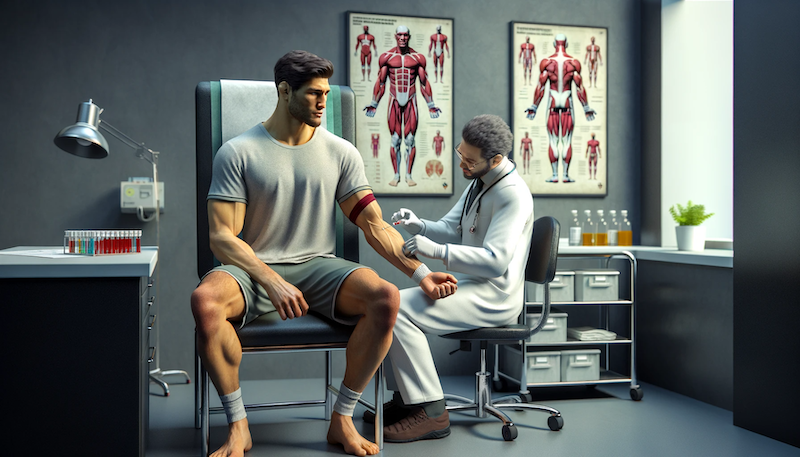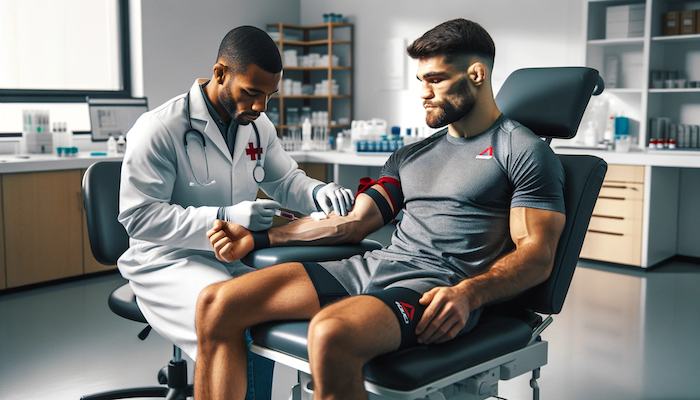
Are you wondering whether UFC fighters get tested for HIV and other diseases?
In this article, we explore everything there is to know about HIV, STD, and other disease testing UFC fighters have.
Contents
Do UFC Fighters Get Tested for HIV?
Yes, UFC (and MMA) fighters get tested for HIV. The UFC requires all fighters to undergo comprehensive medical examinations, including blood tests for HIV.
This mandatory testing is crucial for the safety of both the fighter and their opponents, as it helps prevent the transmission of the virus during matches.
Here’s some important details about the UFC’s HIV testing:
Frequency and Timing of Testing
- Initial Testing: Upon signing a contract with the UFC, fighters are tested for HIV during their initial medical examination.
- Pre-Fight Testing: Before each bout, fighters undergo medical testing, including an HIV test, as part of the bout agreement process.
- Testing Before Scheduled Competitions: Many states require that blood work for HIV, Hepatitis B, and Hepatitis C must be conducted no more than 180 days before participation in each scheduled competition.
- Periodic Testing: Fighters may also be subject to periodic health evaluations throughout the year, which can include HIV testing.
- License Renewal Testing: Fighters commonly need to provide negative bloodwork results once per year for HIV and hepatitis within 30 days of their license renewal.
The Testing Process
- HIV testing in the UFC is primarily conducted through blood samples, designed to detect HIV antibodies or antigens.
- Rapid HIV tests might be used in certain situations for quicker results, usually followed by standard blood tests for confirmation.
Who Conducts the Testing?
- Licensed medical professionals, healthcare providers, or medical facilities contracted by the UFC perform these tests.
- Independent medical practitioners or organizations may also be involved, especially during events in various locations.
Importance of HIV Testing
- Preventing Transmission: Essential for preventing the transmission of HIV between fighters due to the physical and blood-contact nature of MMA.
- Fighter Safety: Ensures the health and safety of the fighters in a physically demanding sport.
- Regulatory Compliance: Meets the requirements of athletic commissions overseeing combat sports.
- Public Health Responsibility: Upholds public health standards and manages blood-borne pathogens.
Additional Considerations
- Confidentiality: Test results are confidential, adhering to healthcare privacy laws.
- Post-Test Counseling: Fighters who test positive receive counseling and medical referrals.
- Career Impact: A positive HIV test can significantly affect a fighter’s ability to compete in the UFC and other combat sports organizations.
Do UFC (MMA) Fighters Get Tested for Diseases?

Yes, UFC fighters are tested for a range of diseases, primarily focusing on blood-borne pathogens such as HIV, hepatitis B, and hepatitis C. This is because cuts and the spillage of blood are common in the UFC (MMA), creating a risk for the transmission of these diseases.
To better understand the significance of this testing, let’s delve into the specifics of these diseases, the reasons behind their testing, the frequency of these tests, the professionals responsible for conducting them, and other details.
Key Diseases Tested
HIV (Human Immunodeficiency Virus): A virus that attacks the immune system, potentially leading to AIDS.
Fighters are tested for HIV due to the risk of blood-to-blood contact during fights, which can facilitate the transmission of the virus.
Hepatitis B: A liver infection caused by the hepatitis B virus. It can lead to chronic liver disease and poses a transmission risk during physical contact. Testing is crucial to prevent the spread among fighters.
Hepatitis C: Another liver infection caused by the hepatitis C virus, often leading to chronic liver problems. Like hepatitis B, it can be transmitted through blood, making testing essential in a contact sport like MMA.
Frequency and Methods of Testing
- Regular Testing: Includes testing before signing a contract, renewing an MMA license, when bout agreements are signed before each fight, and at least 6 months before a scheduled fight.
- Concurrent Testing: These diseases are typically tested for at the same time through blood tests.
- Standard Testing Methods: Blood tests are the primary method due to their efficiency and reliability.
Who Conducts the Testing?
The testing of UFC fighters for diseases is primarily overseen and mandated by state athletic commissions, which are responsible for regulating combat sports events in their respective states.
These commissions play a crucial role in ensuring the health and safety of fighters:
State Athletic Commissions: Each state has its athletic commission that sets the medical testing requirements for combat sports events held within their jurisdiction.
These commissions are responsible for ensuring that all fighters meet the necessary health standards to compete.
Medical Professionals: The actual testing of UFC fighters is carried out by medical professionals who are either employed by each Athletic Commission or hired as independent contractors.
These professionals must adhere to the standards and protocols set by the commissions.
UFC’s Role: While the UFC has its own health protocols and requirements for fighters, the organization must comply with the regulations set by the athletic commissions in each state where events are held.
The UFC may also conduct additional tests as part of their fighter health and safety programs, but the mandatory disease testing for each event is governed by the athletic commissions.
Event-Specific Testing: For events, the testing is coordinated by the athletic commission overseeing the event. Fighters must pass these tests to be cleared to compete in that specific state.
Importance of Testing
- Preventing Transmission: Critical in a sport with inherent risks of blood contact.
- Fighter Health and Safety: Ensures fighters aren’t afflicted with conditions that could be detrimental to their health and safety.
- Regulatory Compliance and Public Health: Upholds the UFC’s commitment to public health standards and meets Athletic Commission requirements.
In summary, the testing of UFC fighters for diseases like HIV, hepatitis B, and C is a collaborative effort between the state athletic commissions and the UFC, with the commissions playing a leading role in setting the standards and overseeing the testing process.
This ensures all fighters meet the necessary health requirements to safely compete in each event.
Do UFC Fighters Get Tested for STDs?
No, UFC fighters aren’t routinely tested for most sexually transmitted diseases (STDs) as part of their standard medical evaluations for competition.
However, they’re tested for certain STDs that are also blood-borne pathogens, such as HIV, hepatitis B, and hepatitis C.
This focus is due to the specific risks associated with mixed martial arts (MMA), where cuts and bleeding are common, creating a heightened risk of transmission of these diseases between fighters through blood contact.
While HIV, hepatitis B, and hepatitis C are STDs, their significance in UFC testing protocols stems from their status as blood-borne pathogens.
The testing is primarily focused on these diseases because of their potential for transmission in the combat sports environment, rather than through sexual contact.
While the blood tests conducted for HIV, hepatitis B, and C could theoretically identify other blood-borne STDs, the medical professionals are focused on the specific diseases mandated by the UFC’s protocols.
They’re not conducting a comprehensive STD screening unless specifically required. STDs are generally tested through various methods, including blood tests, urine tests, and physical examinations.
However, these methods aren’t part of the UFC’s standard medical evaluations for fighters.
The UFC’s health protocols are designed to mitigate risks specific to the sport. This includes prioritizing diseases that have a realistic probability of being transmitted during a bout.
While STDs are a serious health concern, management of risks related to STDs not transmitted through blood contact is generally considered a private health matter for fighters, outside the scope of UFC’s mandatory medical testing.
In summary, UFC fighters undergo rigorous medical testing with a primary focus on conditions that pose a direct risk in the context of MMA.
Routine testing for STDs, other than blood-borne diseases like HIV, hepatitis B, and C, isn’t a standard part of the UFC’s medical evaluation process.
The organization’s testing protocols are specifically tailored to address the unique risks inherent in the sport, ensuring the safety and well-being of all fighters.
Are HIV-Positive UFC (MMA) Fighters Allowed To Fight?
HIV-positive UFC fighters are generally not allowed to fight, as most State Athletic Commissions, which regulate MMA events, require negative HIV test results for fighter eligibility.
This regulation significantly impacts the ability of HIV-positive fighters to participate in UFC events, especially considering the global nature of UFC and the need for uniformity in fighter eligibility across various jurisdictions.
Because of this, the UFC doesn’t contract HIV-positive fighters.
Here are some examples of various SAC rules and regulations:
Nevada State Athletic Commission (NAC 467.027) stipulates that fighters must provide medical tests showing they are not infected with HIV.
Specifically, the regulation requires:
- Tests performed by a certified laboratory no earlier than 30 days before the application submission.
- Submission of these tests within 7 days before the date of the first bout in the calendar year for which the license is valid.
- Confirmation that the fighter is not infected with HIV or hepatitis.
California State Athletic Commission mandates that fighters present evidence of negative tests for HIV, hepatitis C virus (HCV), and hepatitis B virus (HBV) antigen within 30 days before license application or renewal.
Additionally, a negative report for all 3 tests is required if a match occurs 180 days (6 months) or more after the date of the tests submitted for license issuance or renewal.
However, some states like Connecticut allow MMA fighters to compete with “Non-Reactive” HIV blood work, provided it is within 6 months of a fight.
This indicates that while UFC fighters face strict regulations against competing if HIV-positive, MMA fighters in local promotions within certain states may still be able to compete under these specific conditions.




